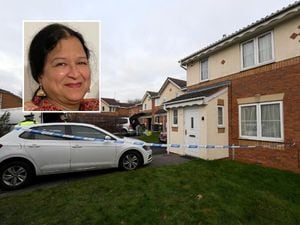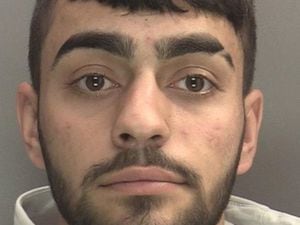The Queen and her Prime Ministers
On Friday morning, Her Majesty the Queen could be appointing her 13th Prime Minister.
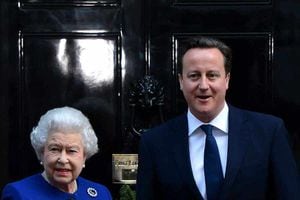
That scenario would require an outright Labour majority with Ed Miliband in the back seat of a black Jaguar limousine sweeping through the gates of Buckingham Palace and a broadcast helicopter overhead.
But if the polls are to be believed, it is likely Her Majesty wont be coming face to face with the next Premier for several days as fierce negotiations take place between the parties.
And there is even the prospect that we could face a second General Election if there is no resolution.
Officials at Buckingham Palace have warned that the Queen must not be dragged into political wrangling amid fears that David Cameron or Ed Miliband might attempt to use her as a prop for a government that lacks a majority.
With a hung parliament on the cards, Royal courtiers are concerned, it is rumoured, that either leader could ambush the Queen with an attempt to rule as a minority government to cement their claims to power.
The Queen has a special relationship with the Prime Minister.
As well as her two prerogatives of confirming a new Prime Minister in office and to grant a dissolution of Parliament, she gives a weekly audience to the Prime Minister at which she has a right and a duty to express her views on Government matters.
These are given such importance that if either the Queen or the Prime Minister are not available to meet, then they will speak by telephone.
These meetings, as with all communications between Her Majesty and her Government, remain strictly confidential.
But her two youngest Prime Misters are said to created fury by revealing details of her exchanges.
Mr Cameron was overheard bragging to former New York mayor Michael Bloomberg how the Queen had 'purred down the line' after he phoned her to say Scotland had voted no to independence. He was forced to make a swift apology.
And Tony Blair created fury among the Royal household by revealing details about their conversations in speeches and his memoirs including how the Royals and Number 10 dealt with the death of Princess Diana.
Historian D R Thorpe gives a compelling insight to the relationships between the Monarch and her Prime Ministers.
Her Majesty's first Prime Minister was Winston Churchill.
He was said to be a formidable presence for the young Queen, who remained in awe of the great war leader. At their first audience, Churchill told the Queen he could advise her from a lifetime of experience, but the time would come when she would advise Prime Ministers younger than herself from a similar standpoint. So it has proved. The first of the 12 Prime Ministers younger than the Queen was John Major. Tony Blair and David Cameron were not even born when she acceded to the throne.
In Anthony Eden, her second Prime Minister, the Queen found a sympathetic listener to her concerns, says Mr Thorpe.
Dominating their early meetings was discussion of Princess Margaret's possible marriage to the divorced Group Captain Peter Townsend. The Suez crisis in 1956 led to much speculation about the Queen's views and what she knew of unfolding events. Eden believed that informing the Queen was of supreme importance and all the Suez papers were sent to her, the first time she was to be shown secret government papers. Their relationship was one of impeccable constitutional propriety and confidences were maintained. The Queen was able to draw on these experiences at later audiences with Margaret Thatcher, her eighth Prime Minister, during the Falklands War.
The first time she had to confirm an unelected Prime Minister was exercised in 1957 and in 1963 when the leadership of the Conservative party became vacant between general elections. After taking advice from senior Conservatives, the Queen invited Harold Macmillan to become her third Prime Minister, a process repeated in October 1963 when Sir Alec Douglas-Home was appointed her fourth. During this time it Her Majesty who appointed the Prime Minister, as opposed to the party.
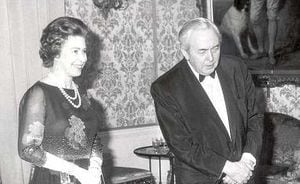
At first, the Queen did not find Macmillan easy to deal with, says Mr Thorpe. He said: "He was unsure whether the Prime Minister's annual visit to Balmoral was a social occasion, with 'talking shop' relegated to the margins, or a Highlands version of his weekly audiences at Buckingham Palace. However, it was not long before they were on the same wavelength.
"Indeed, the Queen soon came to rely on Macmillan to offer wise counsel, both while in office and after his retirement in 1963. They discussed issues including the inauguration of the memorial to President Kennedy at Runnymede in 1965, and the 250th anniversary of 10 Downing Street in 1985. Crucially, the Queen also sought his advice following the uncertain General Election outcomes of February and October 1974."
When Macmillan resigned in October 1963, accusations were made that the Queen had colluded with his supposed blocking of the Deputy Prime Minister, Rab Butler, as his successor, leading to the controversial appointment of Alec Douglas-Home as the new Prime Minister. Mr Thorpe said: "In fact, the Queen had distanced herself from the process, both physically – by staying out of London, at Windsor Castle – and personally – ensuring that her Assistant Private Secretary Sir Edward Ford was the conduit between the Palace and the Prime Minister's Office."
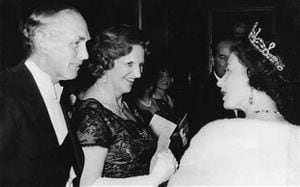
Subsequent events eroded the Queen's prerogative. From July 1965 onwards, the Conservative Party elected its leader, as the Labour Party had done since 1922. Today it would be highly unusual if the Queen invited anyone to become Prime Minister who was not the acknowledged leader of the party commanding a majority in the House of Commons. Outgoing Prime Ministers in mid-term have made things easier for the Queen by staying-on until their party has elected a successor, including Harold Wilson in 1976 and Margaret Thatcher in 1990. When Sir Alec Douglas-Home became Prime Minister in October 1963, for the first time the Queen had a Prime Minister whom she already knew as a friend, Home having been a childhood friend of the Queen Mother. "When Home went to Balmoral for his first Prime Ministerial visit, he heard for the first time the sound of the Queen's official bagpiper before breakfast, an experience he would not have had on his previous visits as a family friend," said Mr Thorpe.
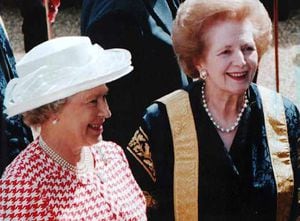
James Callaghan, the seventh Prime Minister during Her Majesty's reign, observed that that the Queen provided friendliness, not friendship to her Prime Ministers. Wilson, the Queen's fifth premier, and Callaghan, her first two Labour Prime Ministers, both got on famously with the Queen. Mr Thorpe said: "Wilson enjoyed the informality of helping with the washing-up after the Balmoral barbecues, unlike Thatcher for whom these weekends interrupted work. Wilson noted that the Queen respected those who had served in the armed forces, which made her relationship with Callaghan, who had been in the Royal Navy, so relaxed." The relationship with Edward Heath, number six, was not always easy, as his world-view differed sharply from that of the Queen.

"European integration was Heath's vision," said Thorpe. "The Queen, however, saw her role as Head of the Commonwealth to be of supreme importance.
For this reason she lamented the loss, in 1997, of the Royal Yacht Britannia (a decision wrongly ascribed to Tony Blair, but in fact inherited from the Major government), which had enabled her to visit the smaller, more remote Commonwealth countries."
Reign
So far in the Queen's reign there have been 16 dissolutions of parliament – including the current one – with the two indecisive elections in 1974 being potentially the most difficult. Mr Thorpe said: "Returning from Australia in February 1974, the Queen's role proved invaluable in a volatile and uncertain political climate. However, the recent Fixed Term Act, setting a statutory, five-year parliament, has in effect removed that prerogative, except in the most unlikely of circumstances. In 1952 when she came to the throne, the Queen could choose the Prime Minister, and could grant, or not grant, a dissolution of parliament. Now, in effect, she can do neither. The party commanding a majority in the House of Commons presents its accepted leader to the Queen after a General Election or a change of party leadership in the governing party."
Mrs Thatcher and the Queen are said to have had a rocky relationship. It is reported that Mrs Thatcher had a habit of always turning up for the weekly audience 15 minutes early. And, just as regularly, instead of admitting her, the Queen would keep her Prime Minister waiting for exactly a quarter of an hour. Relations were easier with John Major, her Majesty's ninth Prime Minister. He and his wife Norma came to prize their Balmoral visits. Mr Blair, the tenth, and his wife Cherie were culturally at odds with the royals. They loved ostentatious wealth, sunshine and call-me-Tony informality. On weekends at Balmoral they were baffled by the royals' fondness for rain-swept Scottish landscapes, hunting and Tupperware. Mrs Blair also declined to curtsey and wrote in her memoirs that her son Leo was conceived in the Queen's Scottish home because she was too shy to bring contraceptive equipment.
The Palace did not dispute that Mr Blair had provided wise counsel over Diana's death but they disapproved of these details being published after he stood down. Whereas Gordon Brown was said to have got on better with the Queen adhering scrupulously to protocol during his brief time as Prime Minister.
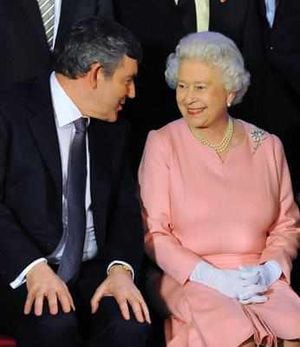
The Fixed Term Act removed a Prime Minister's ability to seek the Queen to call a 'snap' General Election. In its place, a vote for the dissolution of parliament can take place with a two-thirds majority of MPs in the Commons.
Mr Thorpe says: "These changes do not weaken the Queen's 'dignified' position; on the contrary they remove her entirely from the political arena." The outcome of the election remains unclear, as does whether it will be lucky Prime Minister 13 for Mr Miliband.


